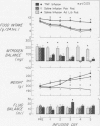Abstract
It has been proposed that many of the physiologic and metabolic changes that occur during critical illness and malignancy are mediated by the cytokine tumor necrosis factor alpha/cachectin (TNF). To test this hypothesis, a study of the metabolic responses that occurred during 5 days of continuous intravenous (I.V.) infusion of TNF both in rats and tumor-bearing humans was conducted. TNF administration was associated with anorexia, fluid retention, acute phase responses, and negative nitrogen balance. In both species, changes in nitrogen balance were related to the onset of anorexia and not to the development of hypermetabolism and accelerated net tissue breakdown. TNF may represent the primary afferent stimulus inducing many of the metabolic changes that occur during critical illness, but it is not solely responsible for the accelerated net proteolysis that occurs in these patients.
Full text
PDF





Images in this article
Selected References
These references are in PubMed. This may not be the complete list of references from this article.
- Balkwill F., Osborne R., Burke F., Naylor S., Talbot D., Durbin H., Tavernier J., Fiers W. Evidence for tumour necrosis factor/cachectin production in cancer. Lancet. 1987 Nov 28;2(8570):1229–1232. doi: 10.1016/s0140-6736(87)91850-2. [DOI] [PubMed] [Google Scholar]
- Beutler B., Cerami A. Cachectin and tumour necrosis factor as two sides of the same biological coin. Nature. 1986 Apr 17;320(6063):584–588. doi: 10.1038/320584a0. [DOI] [PubMed] [Google Scholar]
- Beutler B., Cerami A. Cachectin: more than a tumor necrosis factor. N Engl J Med. 1987 Feb 12;316(7):379–385. doi: 10.1056/NEJM198702123160705. [DOI] [PubMed] [Google Scholar]
- Burt M. E., Arbeit J., Brennan M. F. Chronic arterial and venous access in the unrestrained rat. Am J Physiol. 1980 Apr;238(4):H599–H603. doi: 10.1152/ajpheart.1980.238.4.H599. [DOI] [PubMed] [Google Scholar]
- Dinarello C. A., Cannon J. G., Wolff S. M., Bernheim H. A., Beutler B., Cerami A., Figari I. S., Palladino M. A., Jr, O'Connor J. V. Tumor necrosis factor (cachectin) is an endogenous pyrogen and induces production of interleukin 1. J Exp Med. 1986 Jun 1;163(6):1433–1450. doi: 10.1084/jem.163.6.1433. [DOI] [PMC free article] [PubMed] [Google Scholar]
- Dinarello C. A., Mier J. W. Lymphokines. N Engl J Med. 1987 Oct 8;317(15):940–945. doi: 10.1056/NEJM198710083171506. [DOI] [PubMed] [Google Scholar]
- Michie H. R., Manogue K. R., Spriggs D. R., Revhaug A., O'Dwyer S., Dinarello C. A., Cerami A., Wolff S. M., Wilmore D. W. Detection of circulating tumor necrosis factor after endotoxin administration. N Engl J Med. 1988 Jun 9;318(23):1481–1486. doi: 10.1056/NEJM198806093182301. [DOI] [PubMed] [Google Scholar]
- Morrison S. D. The constancy of the energy expended by rats on spontaneous activity, and the distribution of activity between feeding and non-feeding. J Physiol. 1968 Jul;197(2):305–323. doi: 10.1113/jphysiol.1968.sp008561. [DOI] [PMC free article] [PubMed] [Google Scholar]
- Popp M. B., Brennan M. F. Long-term vascular access in the rat: importance of asepsis. Am J Physiol. 1981 Oct;241(4):H606–H612. doi: 10.1152/ajpheart.1981.241.4.H606. [DOI] [PubMed] [Google Scholar]
- Scuderi P., Sterling K. E., Lam K. S., Finley P. R., Ryan K. J., Ray C. G., Petersen E., Slymen D. J., Salmon S. E. Raised serum levels of tumour necrosis factor in parasitic infections. Lancet. 1986 Dec 13;2(8520):1364–1365. doi: 10.1016/s0140-6736(86)92007-6. [DOI] [PubMed] [Google Scholar]
- Sherman M. L., Spriggs D. R., Arthur K. A., Imamura K., Frei E., 3rd, Kufe D. W. Recombinant human tumor necrosis factor administered as a five-day continuous infusion in cancer patients: phase I toxicity and effects on lipid metabolism. J Clin Oncol. 1988 Feb;6(2):344–350. doi: 10.1200/JCO.1988.6.2.344. [DOI] [PubMed] [Google Scholar]
- Tracey K. J., Fong Y., Hesse D. G., Manogue K. R., Lee A. T., Kuo G. C., Lowry S. F., Cerami A. Anti-cachectin/TNF monoclonal antibodies prevent septic shock during lethal bacteraemia. Nature. 1987 Dec 17;330(6149):662–664. doi: 10.1038/330662a0. [DOI] [PubMed] [Google Scholar]
- Tracey K. J., Lowry S. F., Fahey T. J., 3rd, Albert J. D., Fong Y., Hesse D., Beutler B., Manogue K. R., Calvano S., Wei H. Cachectin/tumor necrosis factor induces lethal shock and stress hormone responses in the dog. Surg Gynecol Obstet. 1987 May;164(5):415–422. [PubMed] [Google Scholar]
- Warren R. S., Starnes H. F., Jr, Gabrilove J. L., Oettgen H. F., Brennan M. F. The acute metabolic effects of tumor necrosis factor administration in humans. Arch Surg. 1987 Dec;122(12):1396–1400. doi: 10.1001/archsurg.1987.01400240042007. [DOI] [PubMed] [Google Scholar]
- Watters J. M., Bessey P. Q., Dinarello C. A., Wolff S. M., Wilmore D. W. Both inflammatory and endocrine mediators stimulate host responses to sepsis. Arch Surg. 1986 Feb;121(2):179–190. doi: 10.1001/archsurg.1986.01400020065008. [DOI] [PubMed] [Google Scholar]




